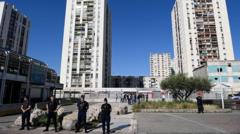After spending over four decades incarcerated in France, pro-Palestinian activist Georges Abdallah is set to be released, marking a significant moment in a long-standing political saga.
Pro-Palestinian Activist Georges Abdallah Set for Release After 41-Year Imprisonment

Pro-Palestinian Activist Georges Abdallah Set for Release After 41-Year Imprisonment
Georges Abdallah's impending release highlights ongoing debates around political prisoners and the Israeli-Palestinian conflict.
Georges Abdallah, a 74-year-old Lebanese national, will be liberated from a French prison this Friday after serving 41 years for his connection to the deaths of two diplomats—one from the United States and the other from Israel—in the late 1980s. His case has transformed him into a symbol within leftist circles advocating for the Palestinian cause.
Abdallah, who has long been considered one of the longest-serving political prisoners related to the Israeli-Palestinian conflict, is anticipated to fly directly to Beirut upon his release. Though his notoriety has dwindled over the years, his continued incarceration has been a rallying point for Marxist-Leninist activists, as evidenced by annual protests demanding his freedom and declarations of him as an "honorary citizen" by various left-leaning municipalities in France.
Despite being eligible for parole since 1999, efforts to secure his release were repeatedly thwarted, allegedly due to diplomatic pressure from the US and Israel, according to his supporters. Speaking to the media, Abdallah reflected on his long imprisonment, stating that his focus on the Palestinian struggle helped him maintain his sanity. Decorated with postcards and revolutionary memorabilia, his prison cell became a silent witness to his enduring fight for recognition.
Born in 1951 in northern Lebanon into a Christian family, Abdallah became involved in the Lebanese Armed Revolutionary Factions (LARF) during the turbulent 1970s, seeking to oppose Israeli and American influence. His group was responsible for multiple attacks in France, including the assassinations of US diplomat Charles Ray and Israeli diplomat Yakov Barsimantov.
His arrest in 1984 led to various charges, and subsequent events, including a French citizen's kidnapping, hampered his potential release. The discovery of weapons in his flat shortly before his trial further cemented his conviction for the murders, resulting in a life sentence despite his claims of innocence.
The US maintains a longstanding interest in Abdallah's imprisonment, with a notable intervention from then-Secretary of State Hillary Clinton, who encouraged France to challenge his potential release. This year, a French court ruled that Abdallah's imprisonment was now "disproportionate," leading to his eventual release, although it mandated his immediate expulsion from France.
Lawyers and supporters have characterized the circumstances surrounding Abdallah's incarceration as a failure of justice, with calls for acknowledgment of the heavy political influences that have colored his journey. As discussions on political prisoners continue, Abdallah's impending freedom remains a focal point in conversations surrounding human rights and the socio-political landscape of the Israeli-Palestinian conflict.





















